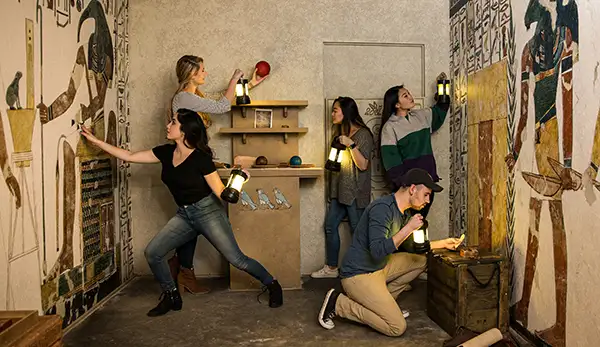Check Out the Best Escape Room in Minneapolis-- Book Your Experience
Team Techniques: Exactly How to Team up Effectively in an Escape Area
Browsing the complexities of a retreat room necessitates greater than mere interest; it calls for a well-coordinated strategy based in clear communication, strategic role tasks, and proficient time monitoring. Teams need to actively listen to every member's insights, designate duties that line up with individual staminas, and maintain routine check-ins to guarantee emphasis and protect against redundancy. By promoting a setting that values cohesion and adaptability, groups can considerably enhance their effectiveness and success prices. The nuances of these techniques can transform the experience, yet exactly how exactly can they be executed to make the most of the capacity for success?
Establish Clear Interaction

To assist in clear interaction, it is necessary to designate a main factor of contact for information dissemination. Quick, concentrated updates from each group participant can keep the group educated without overwhelming them with information.

Assign Roles Purposefully
While clear communication sets the foundation for efficient team effort, assigning roles strategically ensures that each staff member's toughness are made use of successfully. In a getaway area circumstance, the time-sensitive and complicated nature of obstacles necessitates an efficient strategy to task delegation. By identifying and leveraging private expertises, teams can optimize their problem-solving abilities and improve overall efficiency.
Somebody with an eager eye for detail might excel in discovering concealed things, while a rational thinker could be better matched to addressing puzzles. This duty frequently requires strong business and interpersonal abilities.
2nd, guarantee that roles are adaptable and adaptable. As new difficulties arise, the group should be able to pivot, reallocating jobs as called for. This versatility assists preserve energy and avoids traffic jams that could occur because of stiff role assignments.
Ultimately, a tactical technique to duty task not just optimizes the strengths of each team participant however likewise fosters a natural setting, driving the team in the direction of a successful getaway.
Utilize Diverse Skills
Identifying and harnessing the varied abilities within your group can significantly boost your efficiency in a retreat room. Each staff member brings special strengths to the table, and properly leveraging these capacities can accelerate analytical and improve overall efficiency. As an example, an employee with solid analytical abilities might excel at figuring out check out here complicated codes or patterns, while an additional with keen empirical abilities might quickly detect covert ideas that may ignore.
Effective communication is essential to making use of these diverse abilities. Urge team participants to voice their understandings and ideas without delay, making sure that all potential solutions are taken into consideration. This comprehensive approach promotes a vibrant environment where imagination and essential thinking can flourish. Additionally, designating tasks that straighten with each member's toughness can avoid bottlenecks and make certain that progression is continual.
In addition, variety in abilities often equates to diversity in thinking designs, which is very useful in an escape area setting. While some challenges might require rational thinking and this hyperlink precision, others could benefit from creative and association of ideas. By recognizing and leveraging this variety, teams can deal with a wider range of difficulties better, thereby boosting their opportunities of a successful retreat.
Manage Time Successfully

First, allot first mins for a quick study of the room. Identify visible puzzles and divide tasks based on staff member' strengths, making certain that no one is still. Set internal time checkpoints to evaluate development regularly; as an example, purpose to have half the challenges addressed by the mid-point of the game. This technique can help keep the team concentrated and prevent time from sliding away unnoticed.
In addition, stay clear of passage vision. If a puzzle is taking too long, rotate employee or relocate on to one more challenge, returning later on with fresh point of views. Interaction is vital-- keep everybody updated on solved problems and staying jobs to prevent repetitive efforts.
Last but not least, make use of any tips or clues moderately yet strategically - best escape room. Recognizing when to ask for help can save beneficial time. By adhering to these time administration principles, groups can substantially improve their opportunities of an effective and enjoyable retreat space experience
Debrief and Show
Reflection is a necessary element of group advancement and enhancement in the context of retreat rooms. Once the challenge is completed, whether effectively or otherwise, it is essential for the team to engage in an organized debriefing session. This procedure allows staff member to evaluate their performance, recognize staminas, and pinpoint areas for enhancement.
Start the debrief by reviewing what went well. Highlight certain circumstances of effective communication, analytic, and partnership. Acknowledging these positive actions enhances them and encourages their repetition in future challenges.
Go over minutes of confusion, miscommunication, or inadequate techniques. Urge an open and useful discussion where group members can this content share their viewpoints without worry of objection.
Verdict
In conclusion, successful collaboration in a retreat area is based upon clear communication, critical role assignments, the reliable application of diverse abilities, and skillful time administration. By producing a natural and adaptive group environment, the probability of successfully resolving problems and accomplishing the purpose of running away the room is considerably boosted.